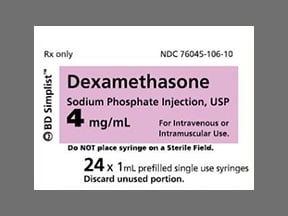
Dexamethasone Sod Phos +rfid Coupons & Savings Card – Discount Prices from $1.01
Dexamethasone is a medication prescribed for a variety of conditions, including arthritis, blood and hormone disorders, allergic reactions, skin and eye issues, respiratory problems, bowel disorders, cancer, and immune system disorders. Additionally, it aids in diagnosing adrenal gland disorders, such as Cushing's syndrome. As a corticosteroid, dexamethasone works by dampening the immune system's response to minimize symptoms like swelling and allergic reactions. This injectable form is particularly beneficial when oral administration is not feasible or when an immediate effect is necessary, especially in severe health cases. It is important to discuss with your doctor the potential risks and benefits of its use, particularly if it involves an epidural injection, as rare but serious side effects can occur.
Our coupons are free to use. Before paying, show the pharmacist your Dexamethasone Sod Phos +rfid savings card to get your free discount. Use our filters below to edit the prescription box to match your needs. The Dexamethasone Sod Phos +rfid prices will update based on your prescription needs. Above our Dexamethasone Sod Phos +rfid coupons, you can change your location to see pharmacy prices and costs in other areas. We're here to help you buy Dexamethasone Sod Phos +rfid at the lowest price with our prescription discount card.
My prescription
Edit
24 solution prefilled syringes 1ML of 4MG/ML, Dexamethasone Sodium Phosphate (1 Syringe)
Select pharmacy

CVS
$21.51
COUPON PRICE
Walmart
$1.01
COUPON PRICE
Walgreens
$2.00
COUPON PRICE
Albertsons
$3.02
COUPON PRICEDexamethasone Sod Phos +rfid savings card
Show this card to your pharmacist
Walmart
$1.01
BIN
ID
PCN
GRP
019876
LH66895728
CHIPPO
LHX
Powered by
Dexamethasone is a medication prescribed for a variety of conditions, including arthritis, blood and hormone disorders, allergic reactions, skin and eye issues, respiratory problems, bowel disorders, cancer, and immune system disorders. Additionally, it aids in diagnosing adrenal gland disorders, such as Cushing's syndrome. As a corticosteroid, dexamethasone works by dampening the immune system's response to minimize symptoms like swelling and allergic reactions. This injectable form is particularly beneficial when oral administration is not feasible or when an immediate effect is necessary, especially in severe health cases. It is important to discuss with your doctor the potential risks and benefits of its use, particularly if it involves an epidural injection, as rare but serious side effects can occur.
Our coupons are free to use. Before paying, show the pharmacist your Dexamethasone Sod Phos +rfid savings card to get your free discount. Use our filters below to edit the prescription box to match your needs. The Dexamethasone Sod Phos +rfid prices will update based on your prescription needs. Above our Dexamethasone Sod Phos +rfid coupons, you can change your location to see pharmacy prices and costs in other areas. We're here to help you buy Dexamethasone Sod Phos +rfid at the lowest price with our prescription discount card.
More prescriptions for ulcerative colitis
coupons from$30.21Save 70%
coupons from$241.51Save 63%
coupons from$1.01Save 99%
coupons from$46.48Save 80%
coupons from$221.83Save 10%
coupons from$20.61Save 70%
coupons from$24.67Save 74%
coupons from$193.94Save 87%
More prescriptions for ulcerative colitis
Sulfasalazine Save 70%coupons from $30.21
Delzicol Save 63%coupons from $241.51
Methylprednisolone Sodium Succ Save 99%coupons from $1.01
Sfrowasa Save 80%coupons from $46.48
Taperdex 12-day Save 10%coupons from $221.83
Nasacort Allergy 24hr Children Save 70%coupons from $20.61
Dexamethasone Intensol Save 74%coupons from $24.67
Uceris Save 87%coupons from $193.94
Dexamethasone Sod Phos +rfid (Dexamethasone Sodium Phosphate) dosage forms
Use our Dexamethasone Sod Phos +rfid (Dexamethasone Sodium Phosphate) 1ML of 4MG/ML coupon with prices from $1.01 for 1 Syringe. You can also use our Dexamethasone Sod Phos +rfid (Dexamethasone Sodium Phosphate) 1ML of 4MG/ML coupon with prices from $1.01 for 2 Syringes. We have a Dexamethasone Sod Phos +rfid (Dexamethasone Sodium Phosphate) 1ML of 4MG/ML coupon with prices from $1.01 for 3 Syringes.
Dosage Quantity Price from Per unit 1ML of 4MG/ML 1 Syringe $1.01 $1.01 1ML of 4MG/ML 2 Syringes $1.01 $0.51 1ML of 4MG/ML 3 Syringes $1.01 $0.34
| Dosage | Quantity | Price from | Per unit |
|---|---|---|---|
| 1ML of 4MG/ML | 1 Syringe | $1.01 | $1.01 |
| 1ML of 4MG/ML | 2 Syringes | $1.01 | $0.51 |
| 1ML of 4MG/ML | 3 Syringes | $1.01 | $0.34 |
